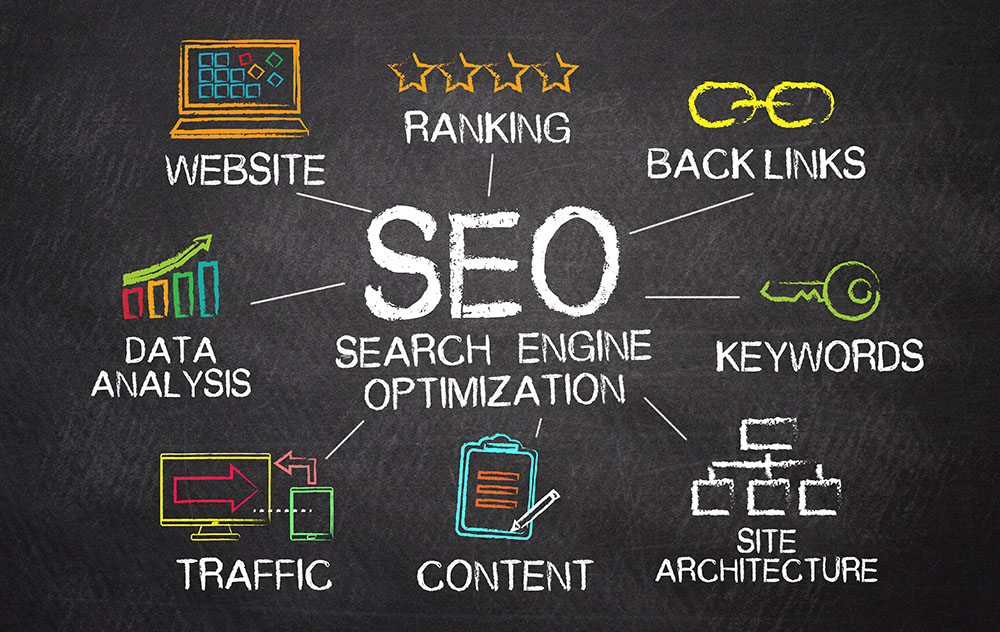Understanding SEO: Everything You Need To Know

What is Conversational Marketing?
August 30, 2021
Top Performing Google Display Ad Sizes
November 6, 2023Understanding SEO
When you hear the term Search Engine Optimization (SEO), your brain might immediately shutter. Your thoughts might also race a mile a minute to try and wrap around the current SEO concepts being discussed. SEO is a term many have heard, but few truly understand.
Additionally, in the last decade, SEO has been a phrase spoken almost as often as the question, “what’s for dinner?” Everyone wants to know what it means and how their business can benefit from SEO practices. If you’re a business owner and are eager to learn all you can about SEO, you might want to pay attention to what the team at Business Nucleus has to say. Our blog will help you understand SEO and why you need it to succeed.
What Exactly Is SEO?
When you’re beginning to investigate the world of SEO, you first need to know what exactly it is. As you know, SEO stands for search engine optimization, which doesn’t tell you much.
To simplify this phrase, you can understand SEO to be the process of improving your websites online search visibility. SEO aims to increase how often your website is seen in the organic search results for Google, Bing, Yahoo, and other search engines.
SEO comes in two forms, on-page and off-page. We will discuss both of these areas in the next sections.
In a nutshell, the more visible your website, the more attention you’ll attract and the better your chances of gaining and retaining customers.
On-Page SEO
On-page SEO is one of the most critical factors in ranking your website.
On-page SEO is the process of optimizing the content on a webpage. This includes meta tags, meta titles, meta descriptions, and the content on the page itself. The goal is to better rank on search engines for relevant keywords.
Meta tags are HTML elements that provide information about a web page’s content. They are used by search engines to categorize pages and rank them in search results pages. A few examples of these tags include:
- Title – this tag specifies what the title of the page should be
- Description – this tag specifies what description should be shown for the page in search engine results
- Keywords – this tag specifies what keywords should be used when indexing the page
- Author – this tag specifies who created or authored the content of a web page
Off-Page SEO
Off-page SEO is a form of Search Engine Optimization focusing on factors outside the website. This includes acquiring links from other websites, building backlinks and creating anchor text.
Link building is one of the most important parts of off-page SEO. It can be done by doing outreach to bloggers, emailing journalists, or purchasing links from link farms.
The goal is to get other sites to link back to your site and create a web of connections that will make your site more visible when people search for content related to your business.
Why Your Business Needs SEO: The Long-Term Benefits
The process of improving your website for search engine results pages (SERPs) is known as search engine optimization (SEO). This entails using a combination of methods intended to increase the visibility of your website to potential customers. It’s important to draw in visitors who are really interested in what you have to offer rather than just increasing traffic overall.
Enhanced Traffic and Visibility
Increased visibility is among SEO’s most noticeable advantages. More people will view your website if it appears higher in search results. SEO can help your business become visible in the search engines for key search terms. You’ll consequently see a consistent flow of organic traffic—users who access your website through search engines.
Credibility and Confidence
High search engine rankings also increase your audience’s perception of your credibility and dependability. Users have a tendency to trust search engines, so if your website appears prominently in search results, it probably has worthwhile and pertinent material. Higher click-through rates and more conversions may result from this trust.
Permanent Investment
Let’s now explore the Search Engine Optimization SEO’s long-term advantages. SEO is an investment in the future of your online presence, as opposed to some other digital marketing techniques that only produce short-term results. This is why:
Long-Term ROI
Once you’ve attained high rankings, they may remain rather steady over time. While you might occasionally need to modify to keep your place, your SEO efforts continue to pay off over time. Paid advertising, in contrast, causes your visibility to vanish as soon as you stop spending money.
SEO can have a significant and sustained return on investment (ROI). Although noticing results could take some time, the advantages keep growing with time. Because of this, SEO is a great option for companies trying to ensure their long-term success.
Cost-Efficiency
Compared to other marketing strategies, SEO has outstanding cost-efficiency. While there are upfront costs associated with website optimization and producing high-quality content, continuing costs are comparatively modest. This is particularly advantageous for companies with modest marketing resources.
Targeted SEO traffic not only increases traffic but the relevancy of that traffic as well. By optimizing for certain terms and phrases, you draw in customers who are actively looking for the goods, services, or information that your company offers. Your marketing efforts will be very successful because this targeted traffic is more likely to turn into leads or customers.
Adaptability
SEO is flexible in the rapidly evolving digital environment. User behavior shifts, algorithms change, and new technologies appear. A planned SEO strategy can adjust to these changes, preserving the long-term effectiveness and competitiveness of your website.
Brand Recognition
It raises brand awareness when your website consistently ranks at the top of search results. Users grow accustomed with your brand name even if they don’t instantly visit your website. If your material reflects their interests, this may encourage brand recall and return visits.
Mobile Enhancement
SEO is essential for making sure your website is mobile-friendly in the age of smartphones and mobile surfing. Optimizing for mobile can raise your search rankings and improve user experience because Google and other search engines give priority to websites that are mobile-responsive.
Edge in Competition
Investing in SEO gives you a competitive advantage. It’s possible that a lot of your rivals have already optimized their websites for search engines. SEO is essential for catching up and staying ahead.
Important Business Insights
Analytics and SEO tools offer insightful data about user behaviors and preferences. You may gather information on the keywords that are bringing in the most visitors, the pages that are doing well, and the areas that need development. You are given the ability to make wise decisions and improve your strategy thanks to this data-driven approach.
Content Excellence
You must produce high-quality content that speaks to the needs and interests of your target audience if you want to do highly in search results. This emphasis on high-quality content boosts your total online presence while also helping your search rankings. It develops your authority in your field and distinguishes you as a trustworthy information source.
Decreases in Bounce Rates
Improving the user experience of your website is frequently a part of SEO optimization. Visitors are less likely to bounce (leave your site instantly) when they find it simple to navigate and that the content relates to their search terms. Lower bounce rates show that readers are interested in and benefiting from your content.
Synergy in Social Media
Social media and SEO are related. It is also more probable that high-quality information will be shared on social media sites when it performs well in search results. Your online visibility is boosted and your reach is extended across more digital platforms thanks to this synergy.
Sustainability
Sustainability has to do with more than simply the environment; it also has to do with how long your company will last. By ensuring that you stay visible and pertinent in the internet environment, SEO helps to sustain your online presence.
Enhancing the User Experience
Optimizing the user experience on your website is a crucial part of SEO. This encompasses elements like quick page load times, mobile friendliness, and simple navigation. Users are more likely to remain, browse, and make a purchase when they have a great experience on your website.
Global Coverage
SEO might assist you in reaching a global audience if your company has international objectives. You may broaden your audience and enter new markets by optimizing your content for several locales and languages.
Monitoring and Analytics
Strong tools are available for assessing your online performance through SEO. You can keep an eye on your traffic, watch your rankings, and evaluate the results of your work. You may continuously improve your strategy using this data-driven method, maximizing your output.
Better Local Presence
Local SEO is essential for companies who have a physical presence or concentrate on serving local customers. Your company will be included in local search results, including map listings, thanks to this. This increases foot traffic to your physical site.
Increase in Conversion Rates
Your conversion rates increase together with the popularity and authority of your website. When users believe in and find value in your material, they are more likely to perform desired actions like buying something, signing up for a subscription, or contacting your company.
Crisis Adaptability – Creating Recession Resistance in Your Business
Businesses with a strong web presence and proven SEO techniques are better positioned to weather the storm during times of crisis or economic depression. Even when other marketing methods may fail, SEO offers consistency and a dependable source of visitors.
SEO And Your Competitors: You Need To Be Doing What They Do – Just Better
You must realize that many competitors use SEO campaigns to market their services and products. This means that you need to be doing what they are doing but better by using a reliable SEO company that will push your business ahead of the rest.
Yet, doing this can be challenging, so you will need to undertake an SEO competitor analysis. Have a look below to learn more about what this entails.
What Exactly Is a SEO Competitor Analysis?
A company like Business Nucleus will complete an SEO competitor analysis that involves a detailed exploration of your business’s digital marketing presence to determine how you compare to your competition. During an SEO competitor analysis, you can expect the following:
- Top content analysis.
- SEO keyword competition analysis.
- An analysis of your competitor’s backlinks.
- Analysis of web design and UX.
- Evaluation of Google My Business listing.
- A keyword gap analysis to determine where you can capitalize on keyword share.
These are only a few of the elements involved in an SEO competitor analysis. To learn more, consider speaking with a Business Nucleus SEO professional at 516-388-7100.
Why Should You Analyze Your Top Competitors
Despite what you might’ve been told in the past, it’s crucial that you seize the opportunity of analyzing your top competitors and their SEO practices.
Even though the competition is healthy and encourages innovation while preventing complacency, there’s nothing wrong with being at the top of the food chain.
Whether you are or aren’t achieving your business goals, it’s important to analyze the competition to see what you can do better or refine your SEO processes. To that purpose, you need to look at the reasons we have listed below surrounding why SEO analysis is a beneficial endeavor.
- There isn’t any flawless SEO strategy. Completing an SEO analysis can highlight any weaknesses in your business marketing or content strategy. After all, if you analyze what your competitors are doing, you can find and close any gaps in your own strategy.
- After undertaking an SEO analysis, you will find new ways to reach your target audience. For example, you could uncover that competitors are using various marketing tactics that are new that you could undertake to beat them at their own game.
- An SEO analysis will help you uncover what you’re doing right. When you know what you’re doing right, you can do more of it to continue growing and overtaking the competition.
These are only a few of the benefits associated with uncovering what the competition is doing to be better than them. We can show you the other benefits at Business Nucleus.
What To Expect When Starting An SEO Campaign
When you’re ready to undertake an SEO campaign for your website, it can be daunting if you’re not sure what will be done to get your products or services out to a wider audience. That’s why we want to tell you what you should expect within the first quarter (one to three months) of initiating an SEO campaign.
First Quarter: Month One To Three
Here’s how a typical month one to three would look when undertaking a new SEO strategy:
- Month one: The first month of an SEO strategy would involve understanding your business. From a high level, this means we will do everything from analyzing your demographic and running analytics to understand where you currently are to analyzing your on-page website SEO, citations, backlinks, and external links. You can also expect to develop your SEO keyword list in the first month.
- Month Two: Taking what we learned in month one we start to take action. We work with your team to make the necessary on-page changes to your website to better align with your goals and industry best practices. During the 2nd month we will also be starting tasks such as citation cleanups and branded SEO keyword backlink building.
- Month Three: In the third month of a new SEO campaign, you and your team will monitor how well the improvements of months one and two are doing. While it’s generally a little too early to see any major movement, your SEO team wil continue to evaluate your program and make any necessary tweaks. Besides ongoing analysis, on-page improvements will continue, new citations will be built, and we will begin to introduce new keywords into our backlink strategies.
Understanding The Cost Of SEO
How much you can expect to budget for your SEO needs will largely depend on your industry and demographic target. To establish the true cost of your SEO strategies, a company like Business Nucleus will analyze the competition in your local area to gauge how much it will cost to rank specific high-ranking keywords in the locations you want to target.
Ultimately, how much SEO costs for your business will depend on how quickly you want to rank with your chosen keywords and how competitive the keywords are in conjunction with your budget. Generally, the more competitive the niche (roofing, medical, law, for example), the more expensive your SEO costs because of how much competition there is for your keywords.
Cost Of SEO Example
Determining the true cost, you should expect to pay can be challenging. That’s why we thought it best to give you an example of what we mean by what we said above.
Ultimately, if you have a budget of $1,000 for SEO in a non-competitive niche for your target demographic, it could take you between six to 12 months to rank your keywords on page one of Google (and other search engines).
This means you will pay this much for this timeframe. In contrast, if you’re in a competitive niche, it could take 18 to 24 months to rank on page one, increasing how much you will need to spend. Additionally, your geographic audience can raise your SEO costs as it will cost less to rank locally than nationally or internationally.
How Business Nucleus Can Help
Unlike other SEO providers, Business Nucleus will work alongside you to strategize your SEO plan from top to bottom. Our expert SEO team will meet with you to discuss your long-term business and SEO goals and demographic targets to curate a growth plan that is guaranteed to improve your visibility, usability, and credibility. If you’re ready to see what SEO can do for your company website, you should contact us here, and one of our team members will reach out to you.






